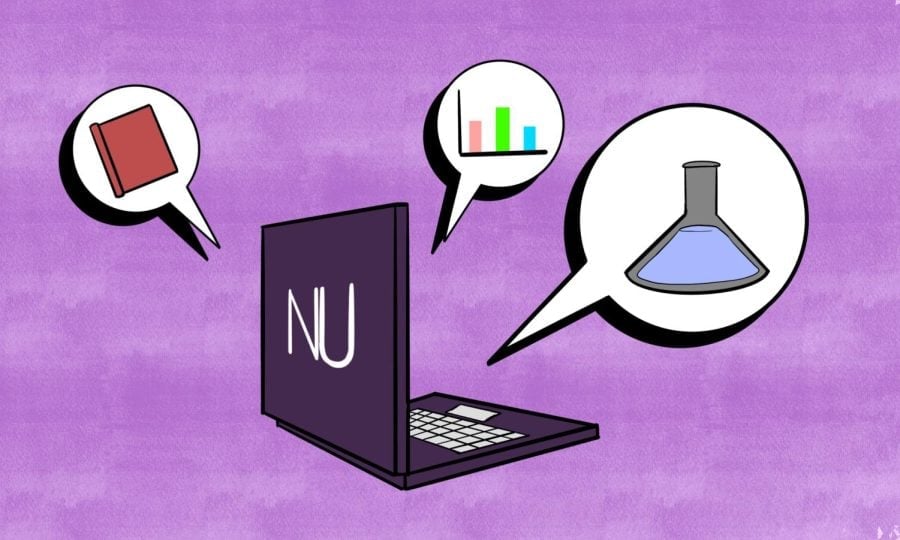A pair of Northwestern alumni received $50,000 to continue developing a personal hand-sanitizing device that they hope could save 100,000 lives.
Yuri Malina (WCAS ’11) and Mert Iseri (McCormick ’11) formed one of 10 teams chosen to participate in Healthbox, a program created by the company Sandbox Industries to support health care entrepreneurs. The program started in January and concluded Wednesday with a 12-minute presentation of each team’s product to investors. Through the program, Malina and Iseri won individualized entrepreneurship mentoring, access to office space and $50,000 to help them develop their product, Sandbox Industries’ director of exploration Jenna Rose said.
Rose said the pair presented their model effectively during the application process for the program. Close to 200 teams applied, she said.
“They were addressing a really important problem that could increase peoples’ health and provide significant financial opportunity for investment,” Rose said. “They were also thoughtful about who their product was for (and) what their users would need in their product and very articulate in how they described their business model.”
Malina said the program gave the two NU graduates a great opportunity to network with investors, hospitals and other major players who could help them get their product off the ground.
“Coming out of this, we made connections with three more hospitals,” Malina said. “It kind of added a stamp of legitimacy.”
According to Malina, who currently works with Iseri as a post-baccalaureate research fellow at NU’s Segal Design Institute, the duo’s device, SwipeSense, “literally works by wiping your hand on it.” Swiping one’s hand on the device’s roller, which is meant to worn on one’s belt, activates a pump and dispenses an alcohol-based gel.
Malina said the intent of SwipeSense is to make washing one’s hands more natural.
“It’s something we want to become second nature,” he said.
The duo said they want doctors and nurses in hospitals to wear their device as a reminder to wash their hands frequently. According to Malina and Iseri, 100,000 people die every year in the United States as a result of infections contracted in hospitals. SwipeSense aims to end this problem by boosting the tendency for medical personnel to wash their hands and increase their rate of compliance to the hand-hygiene standard, which Malina said is currently 40 percent.
“We’re trying to save 100,000 lives, period,” Iseri said. “It’s a very ridiculous problem that’s still going on today, and we wish to stop it, because it should have been stopped a long time ago.”
As co-founders of Design for America, an organization that Malina said seeks to develop products to help solve social issues, Malina and Iseri started developing the device in the summer of 2009 as a solution to an infection problem while working at NorthShore Evanston Hospital, 1301 Central St.
“We spent a lot of time in the hospital and tried to think of ways to get doctors to wash their hands more often,” Malina said.
Malina said he and Iseri often observed doctors wiping their hands on their pants and took that frequent behavior as a cue in designing their product.
“We wanted to take those insights and build them into a solution,” Malina said. “(We asked) how we could change hand washing to make it as natural as possible so people don’t even have to think about it. Things like that spurred the idea.”
SwipeSense, which Malina said contains enough sanitizer for about 50 or 60 swipes, also contains a web application that allows users to track their hand-washing habits and set goals for their behavior. Whenever someone swipes the device, Malina said, the information about his or her use is transmitted through a wireless network and into the Web application.
Malina said the team hopes the tracking feature of the device will motivate doctors and nurses to use it frequently.
Iseri said the device also serves as a good learning tool for patients.
“It’s not only to make it easy for doctors and nurses, but to make the patient understand that hand washing is really important and that you should make sure doctors are doing it,” Iseri said.
The first pilot program for SwipeSense, in which doctors will be using the device, is set to take place in May at Northwestern Memorial Hospital, 251 E. Huron St. Malina said the team and the hospital’s staff are putting together a study that will analyze the device’s effectiveness.
Iseri said he hopes the product can reduce infection in hospitals while setting an example for other students who want to see their products have an impact.
“If you’re passionate about that change and passionate about that problem, you should make that happen,” Iseri said. “We haven’t made it happen yet, but we’re taking a shot at it, and so should you.”







